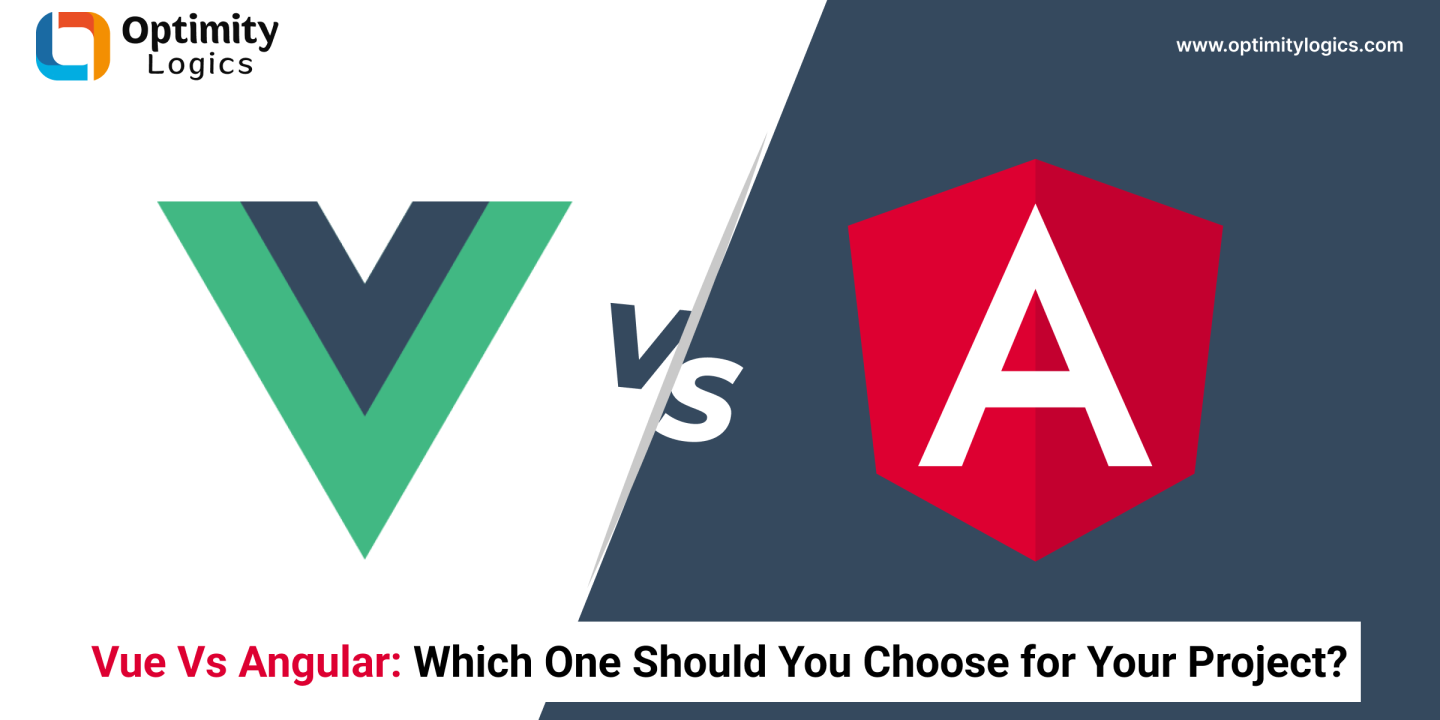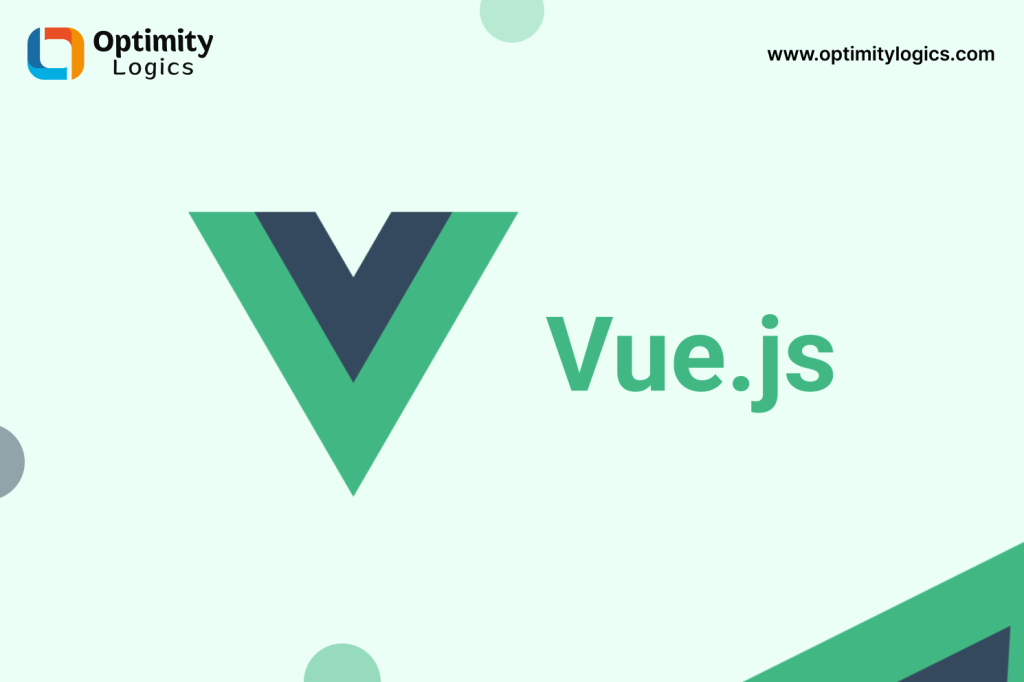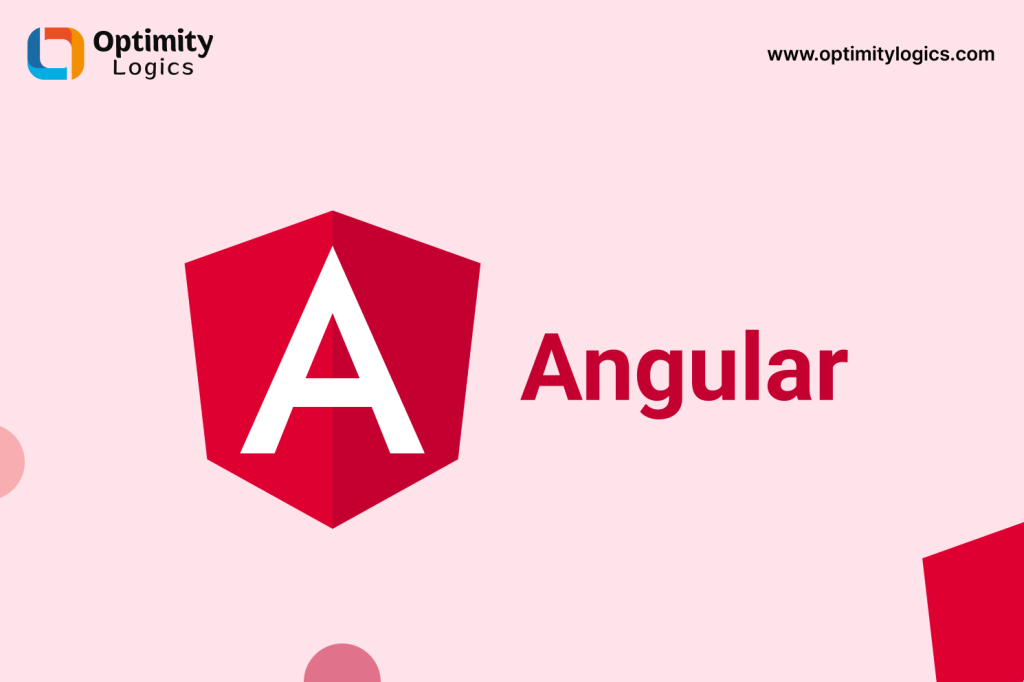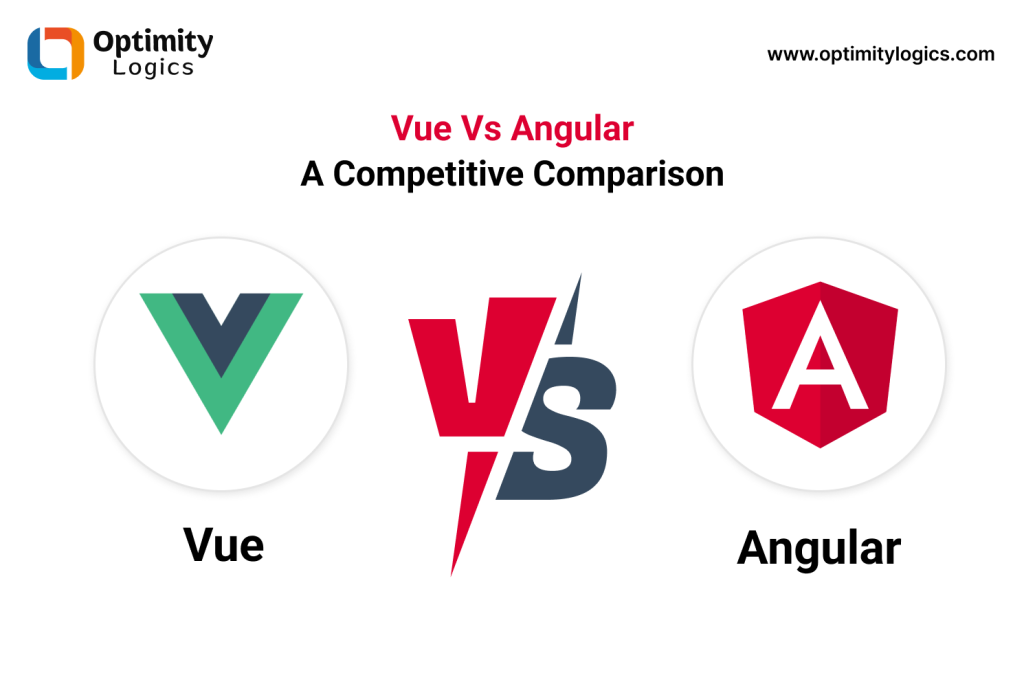
Vue Vs Angular: Choosing the right JavaScript framework is a critical decision that can significantly impact the success and scalability of your project. Among the most popular options are Vue and Angular, both of which offer powerful features for building dynamic, modern web applications. However, they cater to different development needs and use cases.
While Vue is known for its simplicity, flexibility, and ease of integration, Angular, developed by Google, is a more comprehensive framework that provides robust tools for building large-scale applications. Whether you’re looking for a lightweight solution for fast development or a full-featured framework for enterprise-level projects, Vue and Angular can shape your project’s performance and development experience.
At Optimity Logics, we understand that selecting the right technology for your project can significantly impact your development process, user experience, and overall business goals.
Vue and Angular offer unique advantages, but which one suits your specific project needs better? So, In this comparison, we will break down the key features, performance, scalability, and ease of use of both frameworks to help you make an informed decision.
Whether you’re looking for simplicity and flexibility or a robust, feature-rich solution, this guide will help you choose the framework that aligns with your project requirements and long-term vision.
What Is Vue?

Vue is a progressive, open-source JavaScript framework used for building user interfaces and single-page applications (SPAs). Also, It was created by Evan You in 2014 and has gained popularity for its simplicity, flexibility, and ease of integration with other projects.
Vue is designed to be incrementally adoptable, meaning that developers can use it as a full-featured framework for large-scale applications or as a library for integrating specific components into an existing project.
Its core library focuses on the view layer, making it easy to integrate with other tools and libraries, but Vue also offers powerful features such as two-way data binding, a component-based architecture, and reactive data management.
Common Feature Of Vue
Optimity Logics shares some important key features of Vue. As well as Vue is a popular choice for developers who want a lightweight and flexible framework with a gentle learning curve, offering both speed and ease of development for projects of all sizes.
1. Component-Based Architecture
Vue allows developers to create reusable components, making development faster, easier to maintain, and scalable.
2. Two-Way Data Binding
Vue’s reactivity system allows real-time updates between the model and the view, simplifying the management of dynamic content.
3. Virtual DOM
Vue uses a virtual DOM (Document Object Model), which ensures efficient rendering and updating of the UI.
4. Flexibility
Vue is versatile and can be used for building small, modular applications or full-featured web apps. It is also easy to integrate into existing projects without disrupting the architecture.
5. Ease of Learning
Vue’s simplicity and well-structured documentation make it an excellent choice for beginners while still being powerful enough for advanced developers.
Pros Of Vue
– Easy to learn and use
– Flexibility
– Component-Based Architecture
– Easy Integration
– Great Ecosystem
– Virtual DOM
– Active Community Supports
Cons Of Vue
– Small Community & Language Barrier Problems
– Limited Resources – Plugins, Libraries & Extension
What Is Angular?

Google created and maintains the extensive, open-source Angular web application framework. Angular was first made available in 2010, but in 2016 it underwent a thorough overhaul using TypeScript to become Angular. So, Large-scale enterprise systems and dynamic, scalable single-page applications (SPAs) are two common uses for it.
Additionally, With its component-based architecture, Angular offers a full suite of capabilities for creating apps, including HTTP services, routing, form handling, and more. Unlike lighter frameworks that might rely on third-party tools for comparable functionality, this framework is full-fledged, meaning it comes with all the components needed right out of the box.
Common Features Of Angular
Here are shares some important key features of Angular. Angular is widely adopted for large-scale, enterprise-level applications due to its robustness, performance optimisation, and well-defined structure
1. Two-Way Data Binding
Synchronises the model and view, ensuring real-time updates to the UI.
2. Component-Based Architecture
Encourages reusable, modular components to structure large applications efficiently.
3. Directives and Templates
Provides a rich templating system with built-in directives to create dynamic and interactive UIs.
4. TypeScript
Angular is built with TypeScript, adding static typing and other advanced features to JavaScript for better code quality and debugging.
5. RxJS and Observables
Angular leverages RxJS for handling asynchronous data streams and reactive programming.
6. Built-In Tools and Libraries
Angular includes powerful features like Angular CLI, Angular Router, and Angular Forms, providing everything needed for a complete development environment.
Pros Of Angular
– Comprehensive Framework
– Component-Based Architecture
– Two-Way Data Binding
– TypeScript
– Dependency Injection
– High Performance
– Google Support
Cons Of Angular
– Slower Development Time
– Limited Flexibility
– Verbose Code
– Steep Learning Curve
Vue Vs Angular: A Competitive Comparison
Although both Vue and Angular are strong frameworks for creating contemporary web apps, they serve distinct purposes and project kinds. So, Here is a summary of how they compete based on several factors:

Learning Curve
– Vue: Vue is often praised for its gentle learning curve. It’s easy to understand for beginners, with a simpler syntax and smaller framework size, making it ideal for newcomers or those who want to start building applications quickly.
– Angular: Angular has a steeper learning curve due to its complexity and use of TypeScript. It requires more upfront knowledge, making it more suitable for developers with prior experience in JavaScript frameworks and larger development teams.
Performance
– Vue: Vue is lightweight and fast, particularly for small to medium-sized applications. So, It uses a virtual DOM for efficient rendering and updates, making it suitable for high-performance apps.
– Angular: Angular is built for large-scale applications. It also offers high performance, but its size and features like two-way data binding can make it less efficient in smaller projects compared to Vue. However, Angular’s optimization tools (e.g., Ahead-of-Time compilation) help in managing performance for complex apps.
Flexibility vs. Structure
– Vue: Vue offers more flexibility and doesn’t enforce strict architectural patterns. So, Developers have the freedom to structure their applications as they prefer, making it great for smaller projects or teams who want more creative control.
– Angular: Angular is a fully-fledged, opinionated framework with a well-defined structure. This makes it perfect for large, complex projects where scalability and maintainability are essential, but it can be restrictive for smaller projects.
Development Speed
– Vue: Vue enables faster development, especially for small to mid-sized apps. Additionally, Its simplicity and ease of integration make it quick to set up and scale, leading to reduced development time.
– Angular: Due to its complexity and larger codebase, Angular may result in slower development, particularly for smaller projects. However, its strong toolset (e.g., Angular CLI) can still streamline development for large-scale applications.
Community and Ecosystem
– Vue: Vue has a growing community and a vibrant ecosystem, with increasing third-party libraries and plugins. While its community is not as large as Angular’s or React’s, it is strong and rapidly expanding.
– Angular: Backed by Google, Angular has a massive community and a robust ecosystem. So, It comes with built-in tools and a wide range of third-party libraries, making it more established in enterprise-level projects.
Use Case
– Vue: Vue is more suited for small to medium-sized applications or projects where flexibility and fast development are needed. It’s also a good choice for integrating into existing projects as it’s lightweight and easy to adopt.
– Angular: Angular excels in enterprise-level, large-scale applications where the structure, scalability, and built-in tools (like testing and routing) are critical. So, It’s best for applications that require robust architecture and long-term maintenance.
Two-Way Data Binding
– Vue: Vue offers two-way data binding for form inputs and other use cases, but it’s more simplified and lightweight, making it ideal for projects that require reactive components.
– Angular: Angular’s two-way data binding is more sophisticated, but it can add extra complexity and weight to the framework, especially for larger applications.
Popularity and Job Market
– Vue: Vue is popular among startups and smaller teams due to its simplicity, and its popularity is rising. However, its job market and community support are smaller compared to Angular.
– Angular: Angular is widely adopted by large enterprises and has strong industry recognition, which translates to a bigger job market and higher demand for Angular developers in the corporate sector.
Conclusion
At Optimity Logics, we believe that choosing the right framework depends entirely on the unique needs and scope of your project. So, Vue shines with its simplicity, flexibility, and fast learning curve, making it an ideal choice for small to medium-sized projects or teams that value speed and creative freedom. On the other hand, Angular stands out as the go-to option for enterprise-level, large-scale applications that require a structured, feature-rich framework with built-in tools for managing complexity.
Both frameworks have their strengths, and the decision ultimately comes down to your project’s requirements, team expertise, and long-term goals. Whether you opt for Vue’s lightweight nature or Angular’s robust capabilities, at Optimity Logics, we are here to help you navigate the process and implement the best solution for your business. Let’s build something exceptional together!












